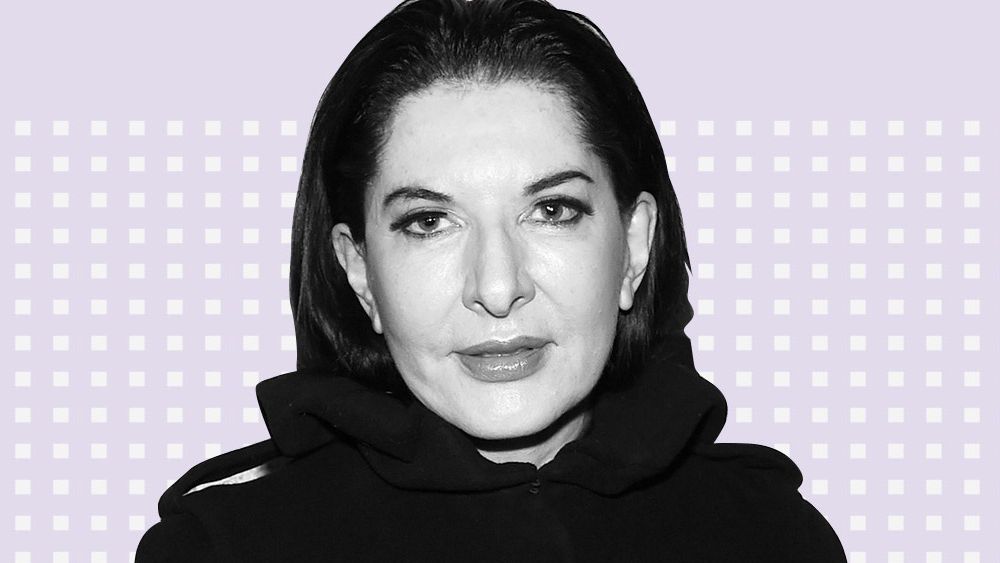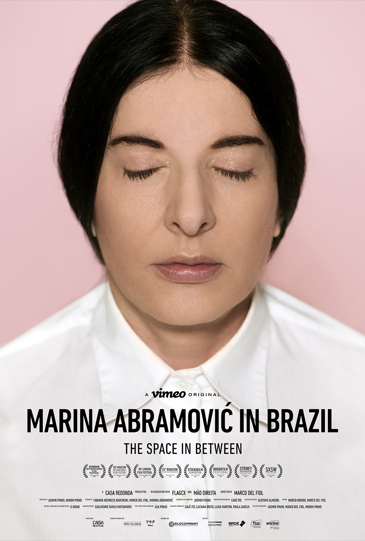Performance Artist Marina Abramović Says Trump Isn't the Problem...We Are
MarieClaire.com speaks to Abramović about finding hope when you think there's none left.

Marina Abramović once sat on a chair at the MoMA, where thousands of people—including Björk, Isabella Rossellini, and Lou Reed—lined up just for a chance to sit across from her. Many of them left crying. It was one of Abramović's notoriously groundbreaking performance pieces, but it was also a moment that proved art's enormous capacity to move humans en masse. It's that spirit of collective consciousness that Abramović explores in her new documentary Marina Abramović in Brazil: The Space Between, which chronicles her travels to Brazil on a quest for self discovery.
MarieClaire.com spoke to Abramović about art's capacity to heal, the role of artists in Donald Trump's America, and whether artwork is susceptible to claims of cultural appropriation.
Marie Claire: To me, your new film is about a loss of hope. So many people are experiencing that on the heels of our election. What do you say to them? How can art help?
Marina Abramović: "There are two kinds of loss of hope, one is the feeling when your pulse slows down and you are going to die, and there's nothing else left. The other loss of hope is when you're living in a country which becomes insecure, and you don't know what the future is. That's existential. In both cases, the only thing I have learned is to find strength in yourself. No one can help you, no one can do anything for you, you have to do the work yourself. The body has an enormous power of healing, if you really believe you are going to be healed, you're going to be healed. If you really believe you're going to die, you're going to die. If you apply this kind of method to everything, then there is hope."
MC: Do you view it as your responsibility to teach people that?
MA: "Of course. I've always asked myself since I was young, what is my duty on this planet? What am I there for? Just to hang around? Everybody must have some purpose. I think if people raise their consciousness and find a purpose, everybody will be helped. We're destroying the planet, and the planet rebels. Stephen Hawking says there will be maximum 1,000 years the human race will survive on this planet if we don't find ways to go to other planets and galaxies. We've done everything to f*ck it up, in a big way. The thing is, raising consciousness is the only way to see that we are a community, that we are connected to each other. We always think of our own profit, but not in connection to others."
MC: This feels epically relevant right now, given Trump's election.
Get exclusive access to fashion and beauty trends, hot-off-the-press celebrity news, and more.
MA: "Talking about Trump, there's nothing wrong with Trump. He's who he is. It's wrong with us, who let him [win]. That's what's wrong. It's not that he's going to change, but the people who think like him. People ask me what book politicians should read. They should read the life of Mahatma Gandhi. We don't have politicians with dignity and morals. We never have, not since Mandela and Gandhi. It's really rare."
"Raising consciousness is the only way to see that we are a community, that we are connected to each other. We always think of our own profit, not in connection to others."
MC: What are your thoughts on cultural appropriation when it comes to art and spirituality? Is there such a thing in your opinion?
MA: "I serve like a bridge. I go to other cultures, learn, put myself in different situations and learn as much as I can, and then go to Western cultures to give. I'm doing this bridging all the time. Western culture has more need because they're so much more degenerated. They're so much more hurt, and misbalanced completely. In the movie, I say we don't need art in nature, because it's so perfect without us. We need it in the cities. But the cities have absolutely lost their own center. They think having ten cars and a big bridge is the way to happiness. It's not. You go to India and you see the poorest village somewhere in the middle of India. And the poor family is happier than any rich billionaire in this country because of spirituality. That's something that I'm trying to do in my work, to send a message to western people. They're the ones who are completely disconnected."
MC: Does the role of artists change in heightened political times or does your mandate remain the same regardless?

MA: "I think the role of artists in the past was very different. Artists had less responsibility in many ways. If you look at the lives of artists, sitting in nature, painting, having the freedom. I think it's over. I think we're living in such a difficult moment of human development. Artists have more responsibility than ever before. If we consider art as oxygen in our society, we have to deliver this oxygen. In my case, my public is my tool. I work with a large public, and create situations so they can get emotionally in touch with themselves. My work is immaterial. It's not painting, it's not sculpture, it's emotions. I'm giving you something to experience yourself."
MC: You are surprisingly self-deprecating and humorous. Is that something that's important to you?
MA: "Incredibly important. One thing I learned from his holiness the Dali Lama is the importance of humor. He said, 'when you open the heart of the person with humor, you can tell him the most truth. But if you tell him truth without humor, the heart closes.' And I really like dark, politically incorrect humor. Americans aren't accepting of black humor, it's terrible. My memoirs are full of humor, I had to change jokes because it was a little too dark."
Watch Marina Abramović in Brazil: The Space in Between on Vimeo starting December 13.
Follow Marie Claire on Facebook for the latest celeb news, beauty tips, fascinating reads, livestream video, and more.
Mehera Bonner is a celebrity and entertainment news writer who enjoys Bravo and Antiques Roadshow with equal enthusiasm. She was previously entertainment editor at Marie Claire and has covered pop culture for over a decade.